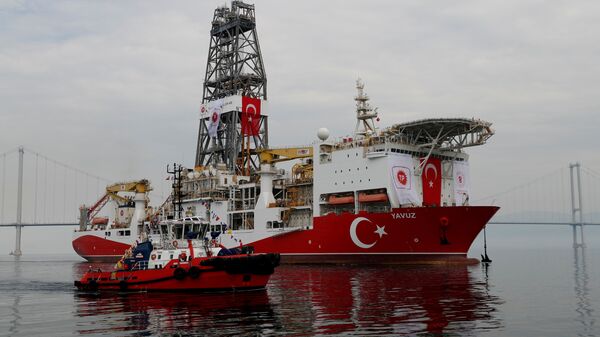On Monday, the Council of the European Union suspended negotiations with Turkey on the Comprehensive Air Transport Agreement as well as the Association Council and meetings of the EU-Turkey high-level dialogues. The council also agreed to reduce a pre-accession assistance to Turkey for 2020 and called on the European Investment Bank to reconsider its lending activities in Turkey.
Turkey Vows to Continue Drilling Despite EU Sanctions
The move came after Turkey launched a second drilling operation northeast of Cyprus within Cypriot territorial waters, two months after the start of the ongoing drilling west of Cyprus. EU and Greek officials rushed to call Turkey's drilling activities illegal. EU Foreign Policy Chief Federica Mogherini called a new drilling operation "a further unacceptable escalation", that violates the sovereignty of Cyprus.
Turkey slammed Brussels for being "biased" and paying no attention to the Turkish Cypriots, who Ankara said have equal rights for the region's fossil fuel resources. Turkey vowed to continue drilling for gas off the Cypriot coast despite the EU sanctions, saying that Brussels had "no word to say to us in this regard".
EU Measures Not Harsh Enough
Tensions over hydrocarbon extraction have escalated following the discovery of possibly lucrative gas reserves off the coast of Cyprus, where there are clashing territorial claims.
According to Dr. Zenonas Tziarras, a researcher at the PRIO Cyprus independent research centre, the European Union's response to Turkey's actions has long been overdue.
"These sanctions will not deter Ankara's plannings for the Eastern Mediterranean, Turkish officials have already made this clear. This is indicative of the fact that the sanctions were not severe enough and that, generally speaking, the policy of sanctions is more often than not ineffective", Tziarras said.
Yet, he suggested that the decision of Brussels to impose sanctions on Turkey showed that the bloc might consider increasing pressure on Ankara if it continued violating international law in the Eastern Mediterranean.
"I would say that they are reflective not only of the realization that Turkey can no longer pursue these kind of policies without any response, but also of the EU's will to display some resolve and coherence in its common foreign and security policy amid criticisms of ineffectiveness", the researcher pointed out.
A similar view was expressed by Ioannis-Sotirios Ioannou, a co-founder of the Geopolitical Cyprus analytical website, who said that the European Union move was largely symbolic and was unlikely to have significant economic implications for Turkey.
"It is more on a symbolic level. Those sanctions affect only a budget of 145 million [euros, $163 million] that is given by the EU to Turkey annually. The EU with a decision like this expressed its solidarity to a member state like Cyprus, but the original strategic goal of Nicosia - to create political and economic cost to Turkey in order for Ankara to counter the drilling in the Cyprus’ EEZ [exclusive economic zone has, somehow, failed]", Ioannou said.
Spat Over Drilling Unlikely to Critically Affect Turkey-EU Relationship
Turkish President Recep Tayyip Erdogan has warned foreign oil companies against exploring for gas in the Eastern Mediterranean. Last year, Turkey sent gunboats to prevent Italian oil company Eni from offshore drilling in the area.
"Ankara’s aggressive policy in the waters of Cyprus rings a bell for major EU countries like Italy and France since both ENI and Total are present in the exclusive economic zones of both Cyprus and Egypt. Do not forget that Turkey started its reforming policy in the area, back in February of 2018, by preventing ENI to drill at block 3 of Cyprus’ EEZ. A policy that now evolved further with its own drilling", Ioannou said.
He suggested that the current spat would not affect the EU-Turkey relationship in a "game-changing way."
"The EU-Turkey relations have faced a lot of problems in the last years, especially after the Ankara-Berlin crisis of 2017. It was already a special relationship with lots of ups and downs that are not related directly to the eastern Mediterranean offshore drilling and the Cyprus problem", Ioannou underlined.
According to the expert, both sides could now push for resuming talks on the Cyprus issue, the European Union as a means of de-escalation and Ankara with the aim bring the hydrocarbons issue to the negotiating table.
At the same time, Michel Liegeois, a professor of political sciences Belgium's Université catholique de Louvain, said that the row over drilling operations started "a new period of minimum relations" between Turkey and the European Union, even suggesting that it may led to economic sanctions against Ankara.
Views and opinions expressed in this article are those of the speakers and do not necessarily reflect those of Sputnik.



